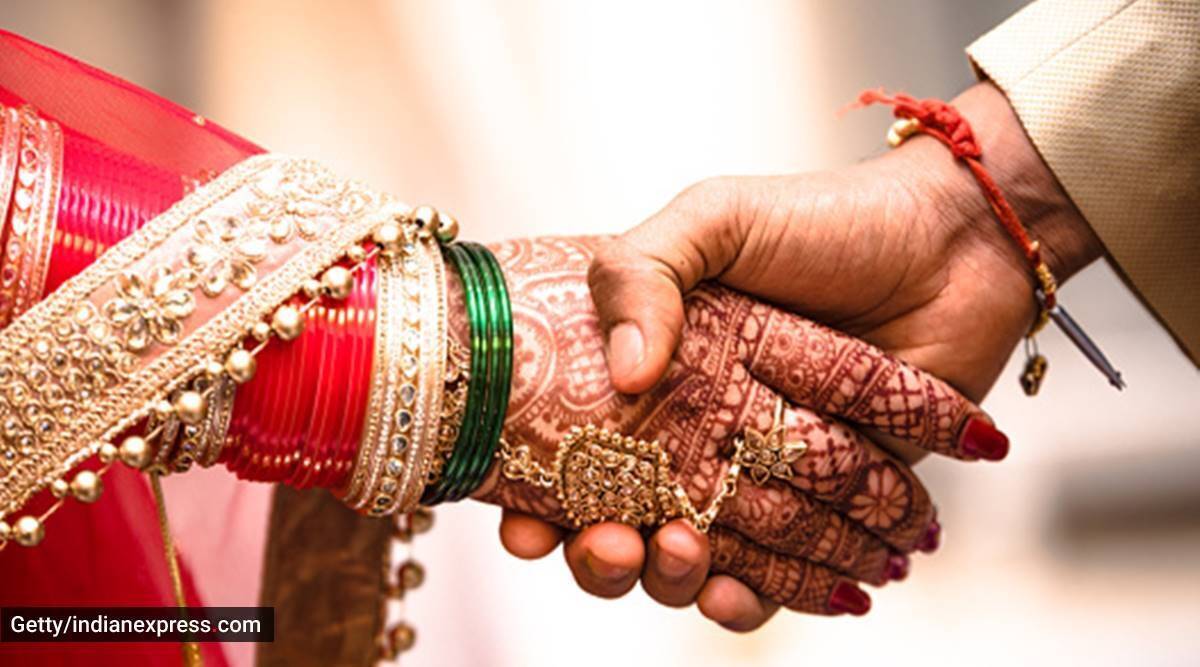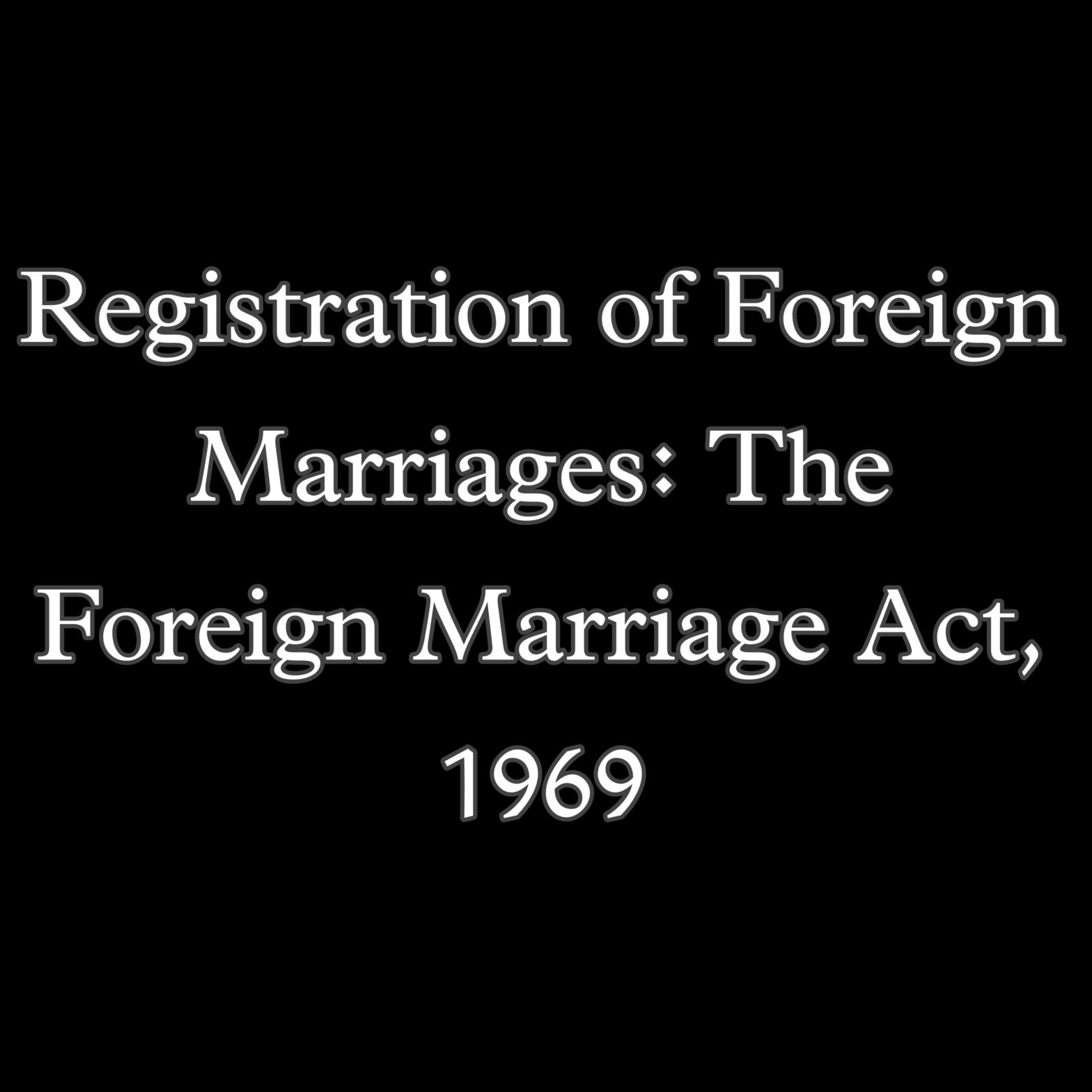The registration of foreign marriages in India is the subject of this article. It looks at the history, the conditions for marriage solemnization, how marriage is solemnized, and the documents that are required for marriage.
Introduction
Originally, marriages were solemnized for two reasons: one, to fulfill religious responsibilities, and the second, to reproduce. The legal repercussions of marriage have never been considered because marriage is seen as a holy and personal bond. The Foreign Marriage Act was enacted in 1969 in response to the growing trend of Indian nationals marrying overseas or with non-resident Indians or foreigners.
History

India’s foreign marriage rules have a long history.
During the British colonial period, Indians went overseas for higher education but mostly returned to India to settle. People began moving overseas for personal or professional reasons following independence and were affected by diverse cultures. These migrants frequently married native wives, either as a result of romantic entanglements with their coworkers or subordinates or to meet Visa requirements. After a while, these migrants began to form groups and establish interpersonal relationships. Their financial situation and style of living improved as time passed. They began influencing the local population with their western lifestyle when they visited their ancestral homes.
After independence, the concept of NRIs was introduced. “In the past, Indians migrated to foreign places for a variety of reasons and became citizens of the country in which they resided. As specified by the Citizenship (Amendment) Act, 2005, these ‘Persons Of Indian Origin–PIOs’ are now known as ‘Overseas Citizens Of India (OCI)’.
After determining the need for foreign marriage rules in India, the Foreign Marriage Act of 1903 became the law of the land. The Special Marriage Act of 1954 established specific regulations on international marriages amongst Indian residents.
The law relating to foreign marriages was a source of considerable ambiguity. Existing legislation only dealt with the outskirts of the subject, and the issue was controlled by principles of private international law that were ambiguous and far from resolved and could not be easily applied to diverse communities.
The 1954 Special Marriage Act was enacted to alleviate some of this confusion. During the debates in parliament about the Special Marriage Act, it was suggested that legislation be enacted for marriages in which one of the parties is an Indian citizen & the other is not. In this context, the government stated that it will look into the matter and establish comprehensive legislation on the subject of foreign weddings. The foreign marriage measure was tabled in parliament as a result of that assurance. The new Foreign Marriage Act of 1969 was introduced fifteen years later, recognizing the necessity for a distinct statute for foreign weddings.
Foundation of The Foreign Marriage Act, 1969
The FOREIGN MARRIAGE ACT, 1969, arose from a bill introduced in parliament in 1963 to put the 23rd report of the Indian Law Commission on the subject of foreign weddings into effect.
The 1963 bill was modeled after the SPECIAL MARRIAGE ACT, 1954, and borrowed provisions from British and Australian foreign marriage legislation. It was signed into law on August 31, 1969.
Registration of Foreign Marriage
Regardless of the nationality of the other party, when the marriage is solemnized, the parties can register under the foreign marriage act. Only when a pre-existing marriage meets all of the elements for a legitimate marriage outlined in Section 4 of the act must it be registered under the act.
The Marriage Officer has the authority to refuse to register a marriage under this provision if the marriage, in his opinion, violates international law or the comity of nations. He must provide a written explanation for this. If a Marriage Officer refuses to register a marriage under this section, the party who applied for registration can file an appeal with the Central Government in the prescribed manner within thirty days of the refusal by the Marriage Officer, and the Marriage Officer will be bound by the Central Government’s decision.
The Marriage Officer shall issue a certificate of marriage in the required form and manner and make an entry in the Marriage Certificate Book, and such certificate shall be signed by the parties to the marriage and by three witnesses. From the day the certificate is issued, a marriage registered under this section is deemed to have been solemnized under this Act.
Conditions for Solemnization of Marriage

- At least one of the parties must be an Indian citizen—this is the cornerstone of the Indian foreign marriage act. The act stipulates that one person must be an Indian and the other must be a foreigner for the marriage to be valid. The parties can be both Indians who are marrying outside of India, or one of them can be a non-Indian (NRI).
- Monogamy- A foreign marriage must be monogamous by definition. Neither party must have a live spouse at the time of the marriage solemnization. When read with s. 24(1)(i) of the Special Marriage Act, 1954, a foreign marriage that violates this rule is null and void[18]. When a marriage is declared null and void, it ceases to be a legal union in the eyes of the law.
- Mental Health- Both parties must be in good mental health at the time of the marriage solemnization. Neither party is allowed to be a moron or crazy. The marriage will be null and void if it is solemnized in violation of this condition.
- Age of parties- At the time of the solemnization of the marriage, the parties’ ages were as follows: The bride must be over the age of eighteen to be eligible to marry. The groom must be over the age of twenty-one.
- Prohibited degrees of relationship- A marriage between two parties cannot be solemnized if they are in prohibited degrees of the relationship as defined in the special marriage act unless the custom governing at least one of them permits it.
Solemnization of marriages
- Give the marriage officer written notification in the district where at least one of the parties has lived for more than 30 days. (Section 5 )
- The officer files the notice with his other records in his office after receiving it. (Section 6)
- Within permitted hours, a marriage can be solemnised by or in front of the marriage officer at his official residence with open doors. (Section 13)
- The parties can choose to have the marriage solemnised in whatever way they want. [Section 13(2)]
- The marriage must be declared official in front of at least three witnesses. [Section 13(2)]
- The declaration, can be made in any language known by the parties, or it can be further translated for each party in the language he or she is familiar with if one or both parties are unable to grasp the language. [Section 13(2)]
- After such affirmations, the marriage will be complete and binding. [Section 13(2)]
- The entire marriage process must be completed within six months of the date the notice was served. (Section16).
Documents, Formalities, and Certifications needed
You must have the following paperwork available before you can legally marry:
- Documents of birth (for age proof)
- A foreign national’s visa must be valid for at least thirty days.
- Both parties must sign a single-status affidavit. A Divorce Decree (for divorcees) or a Certificate of Death (for widows) is required if one of the parties has previously married.
- Passport-size photos and proof of address
- Documentation proving a 30-day stay in India is required.
- If an American citizen desires to marry in a civil ceremony, he may be required to submit a ‘no objection letter’ from the US Embassy or Consulate, as well as documentation of the termination of any past marriages, if any. A citizen of any other foreign country, meanwhile, must show a letter of no objection from his or her country’s embassy or consulate. The parties must also wait at least 30 days from the date of the first application to formalize the marriage so that the marriage officer can issue a notice, which may include a newspaper advertisement, providing the public with an opportunity to express any objections to the marriage.
Landmark cases

Minoti Anand v. Subhash Anand
Two Hindus married in Japan, according to Japanese rituals and customs, and the marriage was registered under the foreign marriage legislation. The act’s section 18 deemed it to be a marriage solemnized under the Foreign Marriage Act. If a dispute emerges, the parties will be entitled to seek matrimonial relief only under the terms of the Special Marriage Act, not the Hindu Marriage Act, because the marriage took place outside of India’s borders.
Joyce sumathi v. Robert Division Brodie
The appellant’s wife was a Christian who lived in India and married in Baharain, where the pair worked. The husband abandoned his wife, who later filed a divorce petition under the legislation. Although the trial court dismissed the petition because the marriage was not registered under section 17 of the Foreign Marriage Act, the court of appeals held that any marriage solemnized under section 18(1) of the act or concerning any other marriage solemnized in a foreign country where at least one of the parties is an Indian is governed by the Foreign Marriage Act, and the wife’s divorce petition was found to be maintainable.
Conclusion
The Foreign Marriage Act regulates marriages between Indians and foreign citizens, as well as marriages between Indians and foreign nationals.
The Foreign Marriage Act, unlike the Hindu Marriage Act, is not concerned with religion. It focuses on the legal issues of marriage as an institution. Both the Hindu Marriage Act and the Special Marriage Act have influenced its design.
FAQs
Is Registration of Foreign Marriage in India is compulsory?
Ans. Yes, If the marriage occurs outside India, it must be registered with a Marriage Officer, who will be appointed from among the diplomatic officers in a foreign country.
Can a Married person get married to someone in another country?
Ans. No, you cannot get married.
Can a Foreigner marry an Indian in India?
Ans. A foreigner who lives and works in India can get married to an Indian citizen.
Can Indians register for marriage in the US?
Ans. A marriage ceremony that is considered valid in India and such a marriage is registered as per Indian laws there is no need to re-register it in the U.S. It is recognised for all legal purposes under the principles of comity.
How can two foreigners get married in India?
Ans. Yes, two foreigners can legally get married in India.
Relevant links
https://prsindia.org/billtrack/the-registration-of-marriage-of-non-resident-indian-bill-2019
